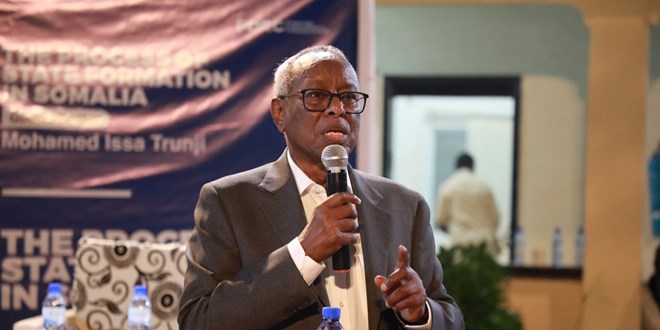By Mohamed Trunji
Thursday June 27, 2024
Thursday June 27, 2024

In the aftermath of the 1991 Somali Civil War, Puntland declared itself an autonomous state in 1998; unlike Somaliland, Puntland is part of the Federal State of Somalia. The name "Puntland" is derived from the Land of Punt mentioned by ancient Egyptian sources. It has a constitution that governs the State. Under this constitution, the government has three branches; the executive, legislature, and judiciary. The administrative capital of Puntland is Garowe, located in Nogal region, and is the seat of the Puntland parliament, presidential palace and government ministries.
The Puntland State is composed of Bari, Mudugh, Nugaal, Sool, Karkaar, Sanaag, and Ayn regions. It occupies one-third of northeastern Somalia and almost half of Somalia’s coastline. In fact, its coastline along the Indian Ocean and the Gulf of Aden stretches for over 1,600 km with abundant fish and other marine resources. Livestock rearing, frankincense, myrrh, manufacturing, and agriculture also contribute largely to the State’s economic activities. The State has a functional constitutional government, security system, public sector, and it is a democratic state. Not less important than Garowe is the city of Boosaaso, formerly known as Bender Kassim. Bosaso, is the capital of Bari region in Puntland State of Somalia. Located on the southern coast of the Gulf of Aden and the Red Sea, it serves as Puntland’s commercial capital and is a major seaport within the autonomous Puntland State.
PDRC Talks
In May this year, I have been invited to serve as guest speaker at the 27th Puntland Development and Research Center Talks. It was my maiden visit to Puntland since its formation in 1998; a visit pushed back at least three times for reasons beyond my control. The Center has its Head Quarters in Garowe, but it has also an office operating in Galkaio, Capital of Mudugh region. The Center is the only institute of its kind operating in the whole Federal Republic of Somalia. The Center was established in May 1999 as an independent, non-partisan research Institute, dedicated to issues such as: peace-building, promotion of democracy and respect of Human Rights. The Talks were held at the PDRC compound in Garowe, Puntland. The theme this year was “The Process of State Formation in Somalia: Lesions from its formation ad Post-Independence Dynamics”. The event mangers provided talking points to cover in the speech. Owing to the importance of the theme, the event has attracted a large audience which varying level of expertise. It is estimated that over 200 people attended the event. The audience included politicians, women’s organization, civil societies, university students, business people and senior citizens. It would be very remiss of not to mention the Audio-visual Unit of the Center which is an important tool for dissemination of information and raising public awareness on issues related to peace, security and reconciliation. It is also necessary to say that the Centre is a platform for government and opposition figures to discuss /solve their political disagreements. The PDRCTalks is a forum in which Somali scholars, veteran politicians and/or retired civil servants are hosted to serve as guest speakers and to deliver an expert presentation on number of topics in politics, history, economics, social issues as well as cultural themes. The theme had generated a lively debate and a barrage of questions and answers focusing, in particular, on political and legal issues raised by the guest speaker.
My impression on Garoowe
Garoowe is growing at an unprecedented rate; in fact, in less than two decades, it had grown from small village, to one of the beautiful and modern cities of today’s Somalia. A first time visitor is struck by the new buildings, the tree-lined paved streets, the café ‘and bars sprouting up on every corner of the city. Shopping centers selling or buying all kinds of merchandise are open day and night. The city hosts a mixture of people originating from as far a part places as Baidoa and Bakol regions. A noticeable foreign community, particularly Ethiopians, doing all kind of menial jobs, such as janitorial jobs and shoeshine freely works side by side with the local people.
The Presidential Palace and the government offices are located in one of the most opulent neighborhood of the city. It was a good opportunity for me to pay courtesy call on the President of the State, Hon. Said Abdullahi Deni , the Vice President, Hon. Ilyas Osman Ligator. I met also a number of Ministers in the regional State, the first among them, my good friend, Hon. Said Jama Ali Korshel. He was instrumental in introducing me to the two highest ranking executives of the State referred above. I thank him for that and for his kindness. The Ministers I met include Hon.Abdirahman Sheikh Ahmed Habarwa, Hon. Mohamed Doonyaale and Hon. Abdi Farah Juxa, the flamboyant Minister of Domestic Affairs. I thank all of them for their friendship. Last, but not least, I express my deep-felt thanks to my former colleague Hassan Yousuf Nour, the President of the Supreme Court of Puntland, for the warm welcome he accorded me.
The remarkable achievements realized by Puntland State, since its inception, in terms of state-building, security and reconciliation, gives the clear idea that the rest of the Federal States are all lagging far behind Puntland. One can really speak of two-tier Federal States. My gratitude goes to the entire PRRC staff for their assistance and for the efforts they made to make my job successful.
My mission to Puntland ended up with an excursion to Eyl, some 230Km from Garoowe, and to Boosaaso, some 500Km. However, and despite the long and exhausting journey, all the same, it was and enjoyable experience.
Mohamed Trunji
E-mail: [email protected]
Mohamed Trunji
E-mail: [email protected]